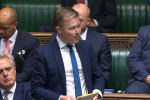Bradley has urged the Government to ensure the UK is the "most attractive destination possible for investment" following a debate in Parliament.
In Westminster Hall yesterday (October 15th), Bradley spoke in a debate on business confidence where he set out what he believes the Government should be doing in order to back businesses.
Following the debate, Bradley said:
"The Government's talking down of our economy and refusal to rule out tax rises for employers at the Budget has damaged business confidence in our country.
"As I set out in my speech, instead of making the UK a hostile destination for investment, the Government should work to ensure we're the most attractive destination possible for investment."
Below you can read Bradley's full remarks from the debate.
"It is a pleasure to serve under your chairmanship, Mrs Harris, and I congratulate my hon. Friend the Member for East Grinstead and Uckfield (Mims Davies) on securing this important debate. She quite rightly pointed out that a strong private sector that is incentivised to invest is the foundation and cornerstone of the living standards and prosperity that we want all of our constituents to be able to enjoy.
"Over the last four years, the UK has dealt with a financial crisis, a pandemic, and an energy shock caused by the war in Ukraine. Despite those changes, since 2010 growth has been higher in the UK than in every other large European economy, with unemployment halved and absolute poverty down. When the Conservatives left government, the UK’s was one of the fastest-growing economies in the G7. However, it is clear that the new Government’s policies and politics have hurt the confidence of businesses across the board; I hear that regularly across my Bromsgrove constituency.
"Returning to the points that I wish to make, the new Government have claimed that their election has positively impacted business confidence, but the Institute of Directors’ economic confidence index, which measures business leader optimism about the prospects for the UK economy, continued to fall in September to minus 38, having been minus 12 in August. According to the Office for National Statistics, 55% of respondents to a voluntary business survey about challenges facing the economy felt that their businesses’ performance would stay the same or decrease over the next year. The CBI’s industrial trends survey for September shows that more manufacturers think that output will fall over the next three months than think it will rise. Potentially most critically of all, GfK’s consumer confidence index fell to minus 20 in September, suggesting that consumers lack confidence in the vitality of our economy. In large part, that is due to concerns about tax rises—concerns shared by many businesses.
"Instead of making the UK a hostile destination for investment, the Government should work to ensure that it is the most attractive destination possible for investment. To become an attractive destination for inward investment, we need to look urgently at the factors that will determine investment decisions. The tax burden, which rose following the global pandemic and the unprecedented level of support provided by the previous Government, is damaging business confidence through fear that there will be higher taxes after the Budget at the end of this month. We need to focus on incentives for businesses investing in large-scale capital projects, access to skills, a long-term industrial plan for the UK economy that will once again reward investment, and a concerted effort on skills development that will lead to a long-term uplift in industrial resilience. That is critical in a world in which our adversaries seek to gain advantage over us and blunt our economic edge.
"We have a great opportunity to reduce our dependence on foreign imports and focus on the long term. That is particularly crucial to my constituency. I would like the Government to focus on small businesses and foster a greater sense of individual entrepreneurship at a grassroots level, which would be a massive benefit to constituencies across the country, town centres such as Bromsgrove’s, and rural businesses.
"My key asks are for the Government to be less ideological in their pursuit of investment in the UK, and to focus on the long term and on conditions that will ultimately drive businesses’ inward investment decisions. They should focus not just on the large corporates, although they are fundamental, but on promoting grass- roots entrepreneurship and cracking down on regulatory bureaucracy, which gets in the way of business investment decisions."




